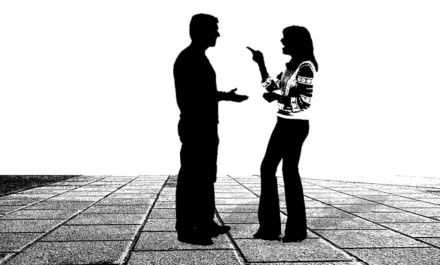Weird as that title might sound, we all have a load of emotions to deal with. Especially if you’ve been in a spiritually abusive environment, sometimes the feelings can be very overwhelming. he thing is, you were probably taught that some of those feelings were sins. I know I was.
For me, since the pastor was also at home as my father, and the pastor’s wife was naturally my mother, there was no escaping church or rhetoric. While I love my parents and I feel they did whatever they did as a sincere attempt to instill in me their values, they were wrong about some things. For example, I was raised to think that showing any anger was a sin–for females at least. There was always that double standard. I saw my dad slam doors and spew anger when people crossed him, but it was certainly not something a “shamefaced” woman should do.
I remember several times where I was told as a child and teen “you need to go pray through” because I was angry about something. This shamed me and made me feel that every time I felt anger I had sinned. It follows, naturally, that I would be very attractive to a dominant male with an abusive nature. My marriage was full of abuse, while I prayed for God to help me be more submissive and to learn to pray for my husband. My parents saw what was going on, and they were very upset. My dad had always treated my mother with utmost respect and kindness. Little did they understand the groundwork that was laid when they raised me to be submissive.
I remember crying in relief when I realized the Bible never said not to be angry. (Eph. 4:26, ESV “Be angry and do not sin; do not let the sun go down on your anger.”) It was okay to feel angry, as long as I didn’t sin in that anger. What a freeing concept!
All of these years later, I work in mental health. I find all sorts of dysfunctional ideas about emotions, but the most telling issue is when I discover a family is uncomfortable with a certain emotion. For my family, it was female anger. For another family it is sadness. Everyone yells and slams doors, but if you cry, that is weak and effeminate. If you feel depressed, suck it up “buttercup”, because life is full of tough breaks.
Some emotions are just messy.
The following story is an example of how I work with kids to teach them about emotions. Please note the character is fictional, although this scenario has played out in my work with children many times.
**************************************************
Little Damion comes into my office with his red hair standing up in every direction. With a streak of dirt across the knee of his pants, and the sheen of sweat on his face, I gather he just came from recess. As I ask about his day and settle in for the intervention necessary to his treatment plan, I am reminded of his family.
Damion’s dad is a gruff farmer with no patience for nonsense. He has always worn his cowboy boots in for family sessions, his piercing blue eyes steely above his untrimmed beard. Mom is plump and friendly, with large dark eyes and a vivacious nature, but she is all business too. Old fashioned and unlikely to change, they have a real challenge in Damion. My goal in family sessions is to help them find other ways of disciplining Damion besides just using a belt and yelling at him, but change is not going to come quickly or easily.
My objective today is to help Damion understand that the sadness in his brown eyes is okay to express in words. He has issues expressing any other emotion besides anger, and it is causing a lot of problems in school. He hits playmates and throws terrible tantrums in school, climbing under the desks and screaming at anyone who comes close. I know that if he ever could learn to express the underlying emotions he feels, then it would release this pressure valve and he could get through a whole week of school without his parents being called.
I start out with something most every little boy finds amusing. “Did you know that feelings are like pooping and peeing?”
His eyes crinkle slightly and he half smiles as he shakes his head no.
“Well, they are. Would you say pooping and peeing are good or bad?”
He looks confused. “I dunno.”
“Well, they can be kind of gross and stinky, but they are good. Pooping helps our body get rid of things that our stomach cannot digest so that we don’t have old food in there rotting. And pee? Well, pee helps clean our blood and get any poisons out of our body. What do you think would happen if we couldn’t poop or pee?”
Damion scratches his cheek with a grubby finger. “We’d die?”
“That’s right. If we can’t poop, it can make us very sick because of all that rotten stuff inside of us. Eventually we could even die if we weren’t able to poop it out. The same is true for pee. If we can’t pee…even just for a whole day…we start getting sick. We’d have to go to the hospital and get a machine to help clean our blood because if we didn’t, we would die. Just like that, our feelings are super important because they give us important information about our safety and our health. Just like pee and poop are good because they help us, all feelings are good. Some of them, like poop, might be kind of gross or we might not like them that much, but all feelings are important to help us.”
He nods that he understands. “It even hurts real bad in my tummy when I need to poop.”
“That’s right. It can hurt us in our heart if we can’t get our feelings out. But I have a question for you. Would it be okay for me to go poop right on the principal’s desk?”
He looks shocked. “NO!” He exclaims, “that would be awful!”
“Right, it would be. Would it be okay if I climb up on a table in the cafeteria and just pee all over the table?”
He chuckles. “No. That would gross us all out.”
Smiling with him, I continue making my point. “Well, would it be okay then if I went into the bathroom and put my pee and poop in the toilet?”
“YES!” he shouts.
“Okay. What I want you to understand is that when you were a baby it was okay for you to poop and pee in your diaper. But mom taught you to put your poop and pee in the toilet. Just like that, I want you to know that our feelings are all okay, but we have to learn when and how to show them. It is like toilet training our feelings. Would it be okay for me to go into the principal’s office and scream in her face?”
“No.” he says, frowning.
“What about if I went in the cafeteria and started yelling at all the kids, stomping my feet and calling them names?”
“That would be very bad.”
I nod. “So, ALL feelings are okay. Sad, mad, happy, glad, grumpy, frustrated, scared…and all the others. They are all important to show. What we are going to do today is learn how to show our feelings in a polite and healthy way.”
I pull out my “I messages” game and continue the intervention with him.
**************************************************
So what we have to realize is that every single one of our emotions are okay. We can give ourselves permission to feel. After all, God is the one who created emotions in the first place. In our journey to healing, it is of utmost importance that we do not allow that old guilt and shame from the spiritually abusive environment to keep us from feeling. Some of our feelings will be very infuriating. At times we may feel like screaming. At other times, we may cry until we feel we have no tears left. Sometimes we might laugh at the ridiculousness of what we were told. It is okay. As long as we can feel emotion we are healthy, we are alive, and we are moving forward.
My therapist explained to me that depression is often caused by stuffing one’s emotions inside and not allowing oneself to feel and to be okay with those feelings–whatever they are. He told me to keep a journal and write down every day a list of feelings that I felt. He explained that new research is showing that simply doing an inventory of our feelings can create new patterns in our brains and can help us begin to feel better over time.
I was so used to rationalizing all my feelings that I didn’t even know what I felt. I googled “emotion wheel” and got a nice graphic that I use to help me figure out what it is I’m feeling when I’m not sure.
The important thing is that we do not stop having those emotions. They are messy and we have to learn what to do with them, but toilet training our feelings is certainly better than the alternative of mental death and stagnation.
********
Shop at our Amazon store! As an Amazon Influencer, this website earns from qualifying purchases.






